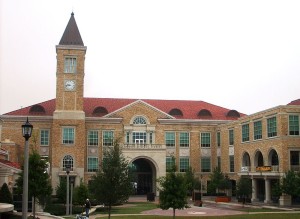Texas Christian University Recognizing Atheist Group, Embracing All Religions
FORT WORTH– The recent recognition of an atheist student organization and the public promotion of different faiths have led some to question the religious policies of Texas Christian University (TCU).
 As previously reported, in February, a 32-year-old transfer student at TCU submitted paperwork to form an atheist and agnostic group called the “Freethinking Frogs.” This act generated widespread media attention, with outlets like Fort Worth Weekly, The Houston Chronicle, Patheos and WORLD Magazine all running articles on the development. Since then, TCU officials reviewed the students’ application, and this spring, quietly granted the Freethinking Frogs recognition as an official student group.
As previously reported, in February, a 32-year-old transfer student at TCU submitted paperwork to form an atheist and agnostic group called the “Freethinking Frogs.” This act generated widespread media attention, with outlets like Fort Worth Weekly, The Houston Chronicle, Patheos and WORLD Magazine all running articles on the development. Since then, TCU officials reviewed the students’ application, and this spring, quietly granted the Freethinking Frogs recognition as an official student group.
As a student organization, members of the Freethinking Frogs are allowed to use TCU’s on-campus facilities for their weekly meetings and other events. Furthermore, the university’s Student Organization Handbook states that recognition is not granted to a student body “if the policies and practices of the organization are in conflict with the University.” Thus, even though recent posts on the Freethinking Frogs’ Facebook page call intelligent design “non-science” and claim the concept of eternal life is a “powerful albeit deceitful idea,” the group is evidently not at odds with TCU policies and practices.
When asked by Christian News Network how this decision to recognize the Freethinking Frogs comports with TCU’s standing as a private Christian school, university spokeswoman Lisa Albert emphasized that the unbelieving students followed all the appropriate procedures in applying for recognition, and were thus granted official acceptance. Additionally, she explained that TCU openly encourages all students to explore a wide spectrum of ideas and beliefs.
“The university culture allows for diversity of thought and open dialogue,” she said, “providing a platform … for students to engage with others of differing opinion and ultimately, make decisions for themselves.”
TCU’s minister, Angela Kaufman, agreed with Albert, saying the university should not be considered a solely Christian school, but rather “a reflection of the larger society around us.”
“A university culture that allows for freedom of belief, encourages critical inquiry and supports the spiritual and moral growth of all students,” Kaufman continued, “provides a platform for students to engage with others, to create dialogue and ultimately to work together on campus and beyond.”
Connect with Christian News
TCU is the largest university affiliated with the Christian Church (Disciples of Christ) denomination. However, even though the school receives regular funding from the Christian Church’s “Disciples Mission Fund” and claims to have “the full support of the Disciples,” the university continues to invest in the “TCU Interfaith Initiative.” According to TCU’s website, the Interfaith Initiative is an inclusive religious outreach designed “to celebrate our individual beliefs, learn about one another and work together to change … the world.”
One of the non-Christian organizations promoted by the Initiative is the “Interfaith Alliance,” a group dedicated to “challeng[ing] the bigotry and hatred arising from religious and political extremism infiltrating American politics.” As stated on their website, the Interfaith Alliance is also committed to “preserving the boundary between religion and government,” and “help[ing] religious leaders and politicians navigate the boundary between politics and religion in a way that safeguards the separation of church and state.”
Not only does TCU endorse such controversial organizations, but the university’s “Religious and Spiritual Life” branch has promoted non-Christian causes and organizations on social media sites. For instance, in April, the university shared a link on their “Faith and Spirit” Facebook page from the “Muslims for Peace” website with a pro-Muhammad message.
“The life of the Holy Prophet, peace be on him, was a life of grand success,” the link reads. “In his high moral qualities, his spiritual power, his high resolve, the excellence and perfection of his teaching, his perfect example and the acceptance of his prayers, in short, in every aspect of his life, he exhibited such bright signs that even a person of low intelligence, provided he is not inspired by unreasonable rancor and enmity, is forced to confess that he was a perfect example of the manifestation of Divine qualities and was a perfect man.”
As TCU attempts to both receive Christian Church funds and welcome various religions — including atheism, some alumni are not happy with the apparent duplicity. Larry Morton, a 1973 TCU graduate, recently mailed a letter to The TCU Magazine, in which he criticized the university’s choice to move away from steadfast Christianity.
“I thought TCU was a Christian-based university,” Morton wrote. “The second word in TCU is still ‘Christian’ I do believe. The sad truth is that most schools of higher learning have caved to the secular model of ‘fairness’ and ‘relativism,’ which has corrupted many young minds who are becoming our future leaders. … This is a tragedy in that we can see what life without God as the center is doing to our culture.” ChristianNews
